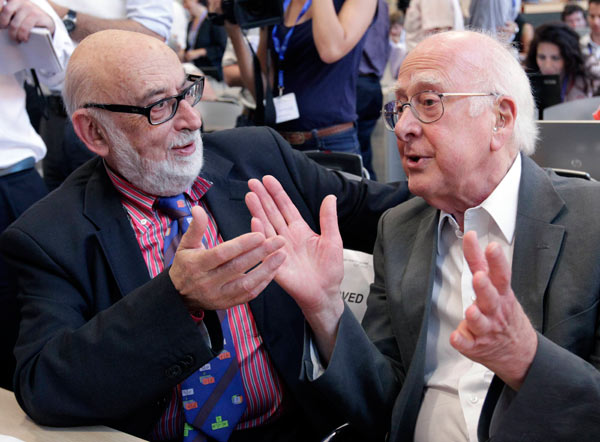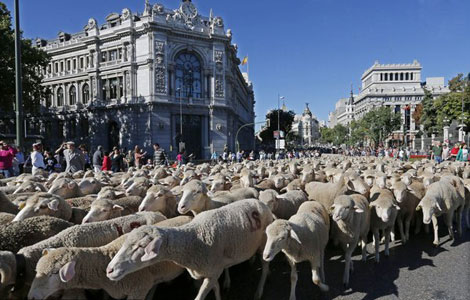

 |
|
File picture of British physicist Peter Higgs (R) talking with Belgium physicist Francois Englert before a news conference on the search for the Higgs boson at the European Organization for Nuclear Research (CERN) in Meyrin near Geneva July 4, 2012. Britain's Peter Higgs and Belgium's Francois Englert won the 2013 Nobel prize for physics for predicting the existence of the Higgs boson - the particle key to explaining why elementary matter has mass - the award-giving body said October 8, 2013.[Photo/Agencies] |
STOCKHOLM - Britain's Peter Higgs and Francois Englert of Belgium won the Nobel Prize for physics on Tuesday for predicting the existence of the Higgs boson particle that explains how elementary matter attained the mass to form stars and planets.
The insight has been hailed as one of the most important in the understanding of the cosmos. Without the Higgs mechanism all particles would travel at the speed of light and atoms would not exist.
Half a century after the scientists' original prediction, the new building block of nature was finally detected in 2012 at the European Organization for Nuclear Research (CERN) centre's giant, underground particle-smasher near Geneva.
"I am overwhelmed to receive this award," said Higgs, who is known to shun the limelight and did not appear in public on Tuesday despite winning the world's top science prize.
"I hope this recognition of fundamental science will help raise awareness of the value of blue-sky research," he said in a statement via the University of Edinburgh where he works.
The two scientists had been favourites to share the 8 million Swedish crown ($1.25 million) prize after their theoretical work was vindicated by the CERN experiments.
To find the elusive particle, scientists at the Large Hadron Collider (LHC) had to pore over data from the wreckage of trillions of sub-atomic proton collisions.
The Higgs boson is the last piece of the Standard Model of physics that describes the fundamental make-up of the universe. Some commentators - though not scientists - have called it the "God particle", for its role in turning the Big Bang into an ordered cosmos.
Higgs' and Englert's work shows how elementary particles inside atoms gain mass by interacting with an invisible field pervading all of space - and the more they interact, the heavier they become. The particle associated with the field is the Higgs boson.
The Royal Swedish Academy of Sciences said the prize went to Higgs and Englert for work fundamental to describing how the universe is constructed.
"According to the Standard Model, everything, from flowers and people to stars and planets, consists of just a few building blocks: matter particles."







